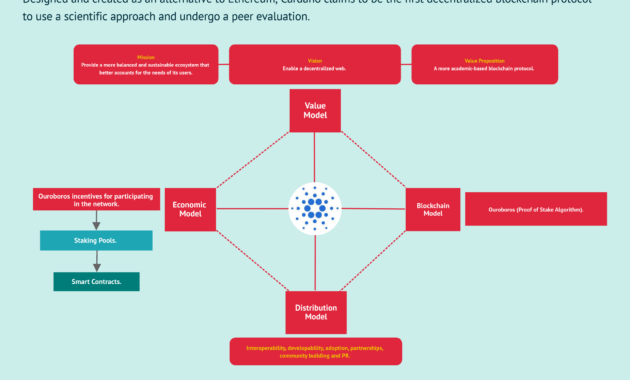Cardano blockchain use cases encompass a wide range of applications in various industries, from finance to supply chain management and identity verification. This article explores how Cardano is transforming traditional systems and enhancing security through its innovative blockchain technology.
In the realm of finance, supply chain management, and identity verification, Cardano is making significant strides with its advanced features and capabilities.
Cardano Blockchain Overview

Cardano is a blockchain platform that aims to provide a more secure and scalable infrastructure for the development of decentralized applications and smart contracts. Launched in 2017 by Input Output Hong Kong (IOHK), Cardano was created by a team of engineers and researchers with a focus on peer-reviewed academic research and a rigorous scientific approach to development.
Brief History of Cardano
Cardano was founded by Charles Hoskinson, one of the co-founders of Ethereum, with the goal of addressing the scalability, interoperability, and sustainability issues faced by existing blockchain platforms. The project went through several development phases, including Byron, Shelley, Goguen, and Basho, each aimed at improving different aspects of the platform.
Key Features of Cardano Blockchain
- Proof of Stake (PoS) Consensus Mechanism: Cardano uses a PoS consensus mechanism called Ouroboros, which is designed to be more energy-efficient and secure compared to Proof of Work (PoW) used by Bitcoin and Ethereum.
- Layered Architecture: Cardano’s architecture is divided into two layers, separating the settlement layer responsible for handling transactions from the computation layer for smart contracts. This design enhances scalability and flexibility.
- Scalability and Interoperability: Cardano aims to address scalability issues by using sidechains and off-chain protocols, allowing for faster and more efficient transaction processing. Additionally, the platform is designed to be interoperable with other blockchains, enabling seamless communication between different networks.
Comparison with Ethereum and Bitcoin
- Scalability: Cardano’s layered architecture and PoS consensus mechanism make it more scalable than Bitcoin and Ethereum, which are currently facing challenges related to transaction speed and network congestion.
- Sustainability: Cardano’s focus on academic research and peer-reviewed development processes sets it apart from Ethereum and Bitcoin, which rely more on community-driven updates and improvements.
- Interoperability: While Ethereum and Bitcoin have limited interoperability with other blockchains, Cardano’s design allows for seamless integration with different networks, enhancing the platform’s versatility and usability.
Cardano Use Cases in Finance

Cardano’s innovative blockchain technology is being increasingly utilized in traditional financial systems due to its secure and scalable features. The advantages of using Cardano for financial transactions are numerous, including improved security, reduced costs, increased efficiency, and transparency.
Adoption by Financial Institutions
Financial institutions around the world are recognizing the potential of Cardano and integrating it into their operations. For example, the Ethiopian government has partnered with IOHK, the company behind Cardano, to explore the implementation of blockchain technology in the country’s agritech sector. This collaboration aims to improve transparency and efficiency in the agricultural supply chain, benefiting both farmers and consumers.
Other financial institutions, such as banks and payment processors, are also exploring the use of Cardano for cross-border payments and remittances. The blockchain’s fast transaction speeds and low fees make it an attractive option for facilitating international financial transactions securely and cost-effectively.
In addition, Cardano’s smart contract capabilities open up a wide range of possibilities for financial applications, such as decentralized finance (DeFi) platforms, insurance services, and asset tokenization. These use cases demonstrate the versatility and potential impact of Cardano in revolutionizing the way financial transactions are conducted.
Cardano Use Cases in Supply Chain Management

Supply chain management is a critical aspect of businesses, ensuring the efficient flow of goods and services from production to consumption. Cardano blockchain technology offers unique solutions to enhance transparency and traceability in supply chains, revolutionizing the way companies manage their operations.
Cardano improves transparency and traceability in supply chains by leveraging blockchain technology to create an immutable record of transactions. Through the use of decentralized ledger technology, companies can track the movement of goods in real-time, ensuring authenticity and reducing the risk of fraud or counterfeiting.
Role of Smart Contracts in Supply Chain Management, Cardano blockchain use cases
Smart contracts play a crucial role in supply chain management using Cardano by automating and enforcing agreements between parties without the need for intermediaries. These self-executing contracts are stored on the blockchain, ensuring transparency and security while reducing costs and processing times.
- Smart contracts on the Cardano blockchain can automatically trigger actions such as payment releases, quality control checks, and shipment notifications based on predefined conditions.
- By using smart contracts, companies can streamline supply chain processes, reduce disputes, and ensure compliance with regulations.
- The transparency and auditability of smart contracts on Cardano provide a high level of trust among supply chain participants, leading to improved efficiency and accountability.
Examples of Companies Leveraging Cardano for Supply Chain Optimization
- BeefChain, a company in the agriculture industry, utilizes Cardano blockchain to track the provenance of beef products, ensuring quality and authenticity from farm to table.
- Scantrust, a Swiss-based supply chain solutions provider, integrates Cardano blockchain to enable secure and transparent tracking of products, combating counterfeiting and ensuring consumer trust.
- IOHK, the organization behind Cardano, collaborates with various enterprises to implement blockchain solutions for optimizing supply chain management processes, increasing efficiency and reducing operational costs.
Cardano Use Cases in Identity Management: Cardano Blockchain Use Cases
Identity management is a critical aspect of security and privacy in today’s digital world. Cardano blockchain technology offers innovative solutions to enhance security and protect personal data in identity verification processes.
Cardano leverages its advanced cryptographic algorithms and decentralized network to provide a secure and transparent environment for identity management. By utilizing blockchain technology, Cardano ensures that personal data is encrypted, decentralized, and tamper-proof, reducing the risk of identity theft and fraud.
Enhanced Security in Identity Verification
- Cardano’s use of cryptographic algorithms ensures secure identity verification processes, protecting sensitive information from unauthorized access.
- The decentralized nature of Cardano’s blockchain network eliminates single points of failure, reducing the risk of data breaches and cyber attacks.
- Smart contracts on the Cardano blockchain enable automated identity verification processes, increasing efficiency and accuracy.
Protection of Personal Data and Privacy
- Cardano enables individuals to have more control over their personal data, allowing them to selectively disclose information without compromising privacy.
- The transparent and immutable nature of the blockchain ensures that personal data is securely stored and cannot be altered or manipulated without authorization.
- Cardano’s privacy features, such as zero-knowledge proofs, allow for confidential transactions and identity verification without revealing sensitive information.
Projects Utilizing Cardano for Identity Management
- Atala Prism: A decentralized identity solution built on the Cardano blockchain, providing secure and verifiable digital identities.
- Cardano Identity Solution: A project focused on developing decentralized identity management solutions for individuals and organizations, enhancing security and privacy.
- Emurgo’s Identity Verification Solution: Leveraging Cardano’s blockchain technology to provide secure and reliable identity verification services for businesses and individuals.
Final Wrap-Up
In conclusion, Cardano’s versatile use cases demonstrate its potential to revolutionize multiple sectors, offering enhanced transparency, security, and efficiency. As the blockchain technology continues to evolve, Cardano stands out as a key player in driving innovation and progress across various industries.

